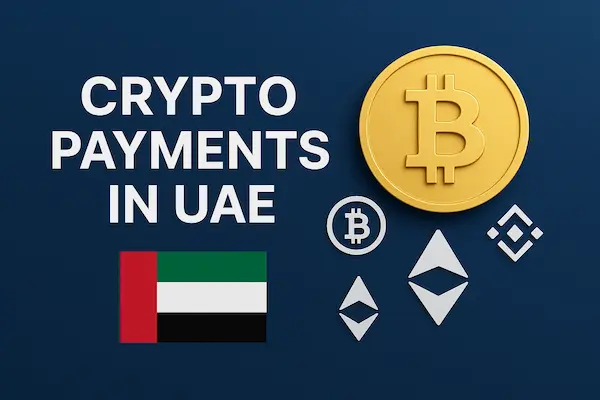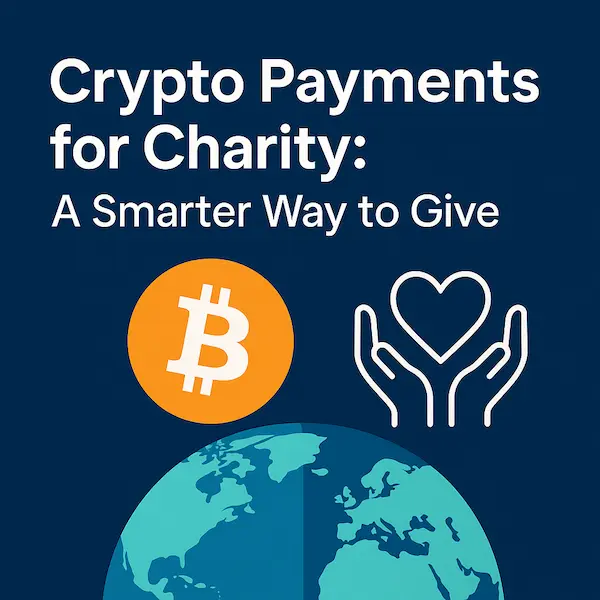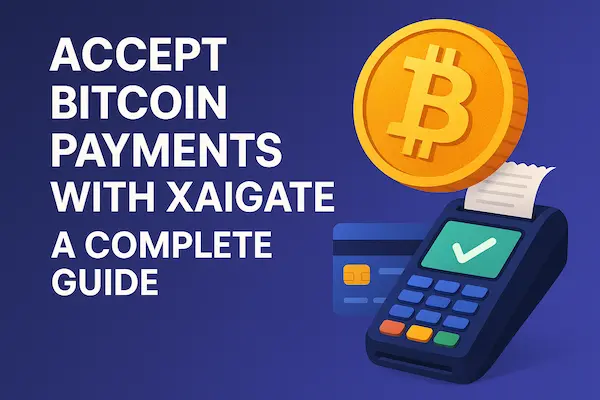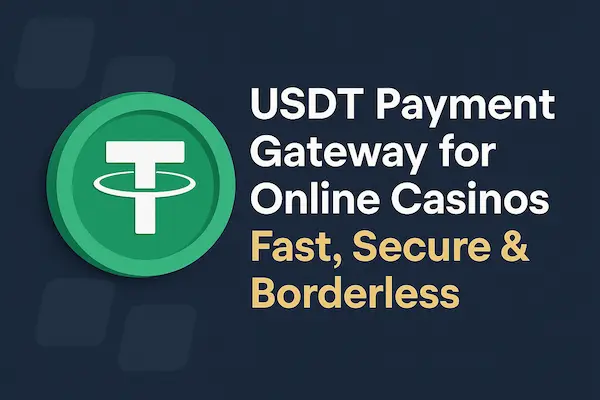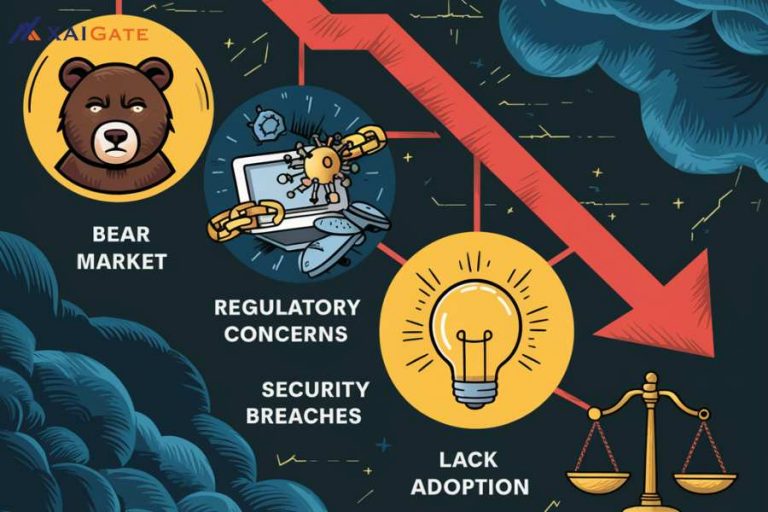The United Arab Emirates (UAE) has quickly become one of the most dynamic centers for digital finance. Once seen as experimental, cryptocurrency is now shaping how people buy, sell, and invest across the country. Today, it is possible to use digital currencies to purchase luxury property, pay for hotel stays, shop in malls, or settle cross-border business transactions. In short, crypto payments in UAE are no longer a niche option — they are part of the mainstream economy.
This rapid growth did not happen by chance. The UAE government has consistently supported innovation while building a strong regulatory foundation. Authorities in Dubai and Abu Dhabi recognized early on that crypto could strengthen the nation’s role as a global financial hub. By offering both legal clarity and cutting-edge infrastructure, they have positioned the UAE ahead of most markets in the race toward digital finance.
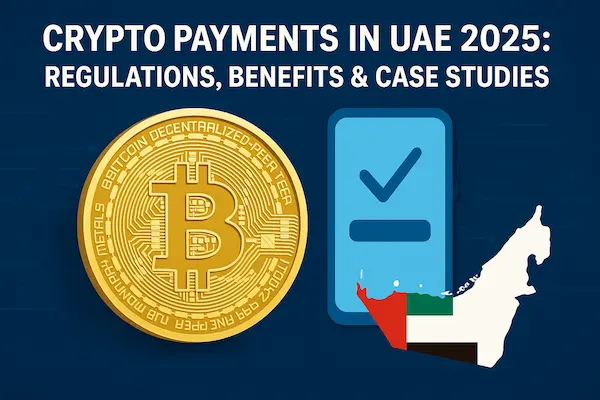
Contents
- 1 1. Latest Update 2025 – UAE Crypto News
- 2 2. Why UAE is Leading the Adoption of Crypto Payments
- 3 3. Benefits of Crypto Payments in UAE
- 4 4. Legal Framework for Crypto Payments in UAE
- 5 5. How to Accept Crypto Payments in UAE
- 6 6. Top Industries Accepting Crypto Payments in UAE
- 7 7. Comparison: Best Crypto Payment Gateways in UAE (2025)
- 8 8. Case Studies: Crypto Payments in UAE
- 9 9. Challenges of Crypto Payments in UAE
- 10 10. Future of Crypto Payments in UAE (2025 & Beyond)
- 11 FAQs: Crypto Payments in UAE
- 12 Conclusion: The Future of Crypto Payments in UAE
1. Latest Update 2025 – UAE Crypto News
The year 2025 is already shaping up as a milestone for the country’s digital economy. In January, Dubai’s Virtual Assets Regulatory Authority (VARA) introduced updated compliance requirements for businesses dealing with digital payments. These rules strengthen anti-money laundering (AML) and know-your-customer (KYC) protections, ensuring that crypto payments in UAE remain secure and trusted by both merchants and consumers.
At the same time, the UAE Central Bank advanced trials of the Digital Dirham (CBDC). This central bank digital currency is designed to work alongside stablecoins such as USDT, USDC, and PYUSD, giving businesses more flexibility in international trade. Early pilot projects have already proven that cross-border settlements can be reduced from days to seconds.
The effects are visible across multiple sectors. Dubai’s property developers reported over $5 billion in real estate sales settled in crypto during 2024, with most transactions handled through stablecoins. Tourism operators and luxury hotels are now openly promoting crypto as a payment option for international visitors. Retailers in Dubai Mall have also joined the trend, allowing customers to purchase watches, cars, and designer goods using digital currencies. These developments confirm that crypto payments in UAE are not just a passing trend but a long-term transformation of the economy.
2. Why UAE is Leading the Adoption of Crypto Payments
The UAE’s success in crypto adoption can be explained by several key factors.
First, there is a clear national vision. Through the Dubai Blockchain Strategy 2030, the government aims to integrate blockchain across finance, logistics, trade, and public services. Payments are central to this plan, making the adoption of crypto a natural step forward.
Second, the UAE is home to a highly international population. With millions of expatriates and a constant flow of tourists and investors, there is constant demand for fast and affordable cross-border transactions. Supporting crypto payments in UAE allows businesses to meet that demand more effectively than traditional banking systems.
Finally, the country has built a transparent regulatory framework. Institutions like VARA in Dubai and ADGM in Abu Dhabi provide clear licensing for crypto exchanges, custodians, and payment gateways. This gives businesses the confidence to integrate crypto payments without fear of sudden legal changes.
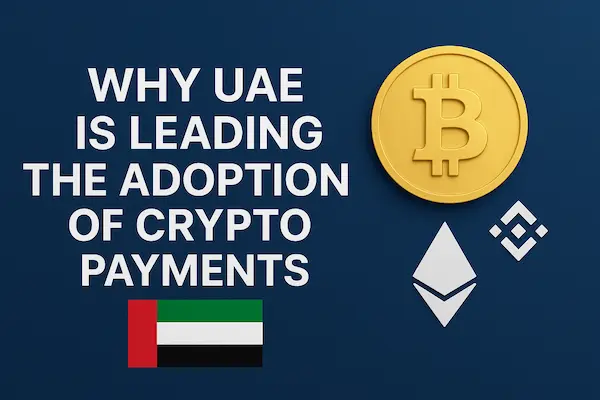
3. Benefits of Crypto Payments in UAE
As digital assets become more widely accepted, businesses across the UAE are discovering real advantages in adopting them. From cost efficiency to faster settlements, the value of crypto payments in UAE extends beyond hype and speculation. Below are the key benefits driving adoption in 2025.
1. Faster Cross-Border Transactions
The UAE acts as a crossroads between Asia, Europe, and Africa, making international transactions a daily necessity. Traditional banking transfers can take several days and involve costly intermediaries. With stablecoins such as USDT and USDC, businesses can receive payments in minutes. This speed makes crypto payments in UAE especially valuable for importers, exporters, and service providers who rely on fast-moving trade.
2. Lower Transaction Fees
Credit card networks and banks typically charge 2–3% on every international payment. In contrast, crypto transactions often cost between 0.2–1%. For companies handling large transactions — such as real estate sales or luxury retail — this difference adds up quickly. By accepting crypto payments in UAE, merchants not only save money but also create more attractive offers for their clients.
3. Stablecoins for Reliability
The biggest concern for many businesses is volatility. This is why stablecoins have become the backbone of crypto payments in UAE. Assets like USDT, USDC, and PYUSD are pegged to the US dollar, ensuring predictable value during transactions. Real estate developers and hotels increasingly rely on these digital dollars, turning what was once a risky experiment into a stable, practical solution.
4. Appeal to International Clients
The UAE hosts millions of tourists, expatriates, and investors each year. Many of them already use crypto and prefer to pay with digital currencies for convenience. Offering crypto payments in UAE signals that a business is forward-thinking and globally connected. For high-value sectors like property and luxury retail, it also builds trust with international buyers who may find traditional banking processes slow and inconvenient.
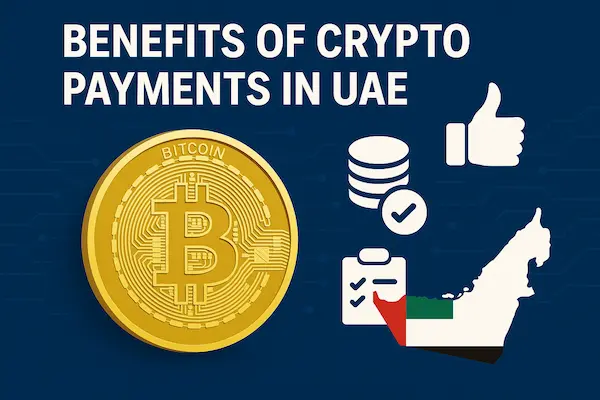
4. Legal Framework for Crypto Payments in UAE
One of the main reasons adoption has accelerated so quickly is the presence of a clear and supportive legal environment. Unlike many countries where rules remain uncertain, the UAE has developed dedicated authorities and licensing systems to guide businesses. This approach gives confidence to both merchants and consumers, ensuring that crypto payments in UAE are not only innovative but also compliant and secure.
1. Dubai VARA Regulations
In 2022, Dubai established the Virtual Assets Regulatory Authority (VARA), the first regulator in the world dedicated entirely to virtual assets. VARA oversees licensing for exchanges, custodians, and payment gateways. By 2025, the framework has matured, allowing businesses to apply for crypto payment licenses that meet international standards. This clarity has made Dubai especially attractive to companies seeking a stable base for operations in the Middle East.
2. Taxation and AML/KYC Requirements
The UAE government has also emphasized transparency in financial flows. All companies offering crypto payments in UAE must comply with anti-money laundering (AML) and know-your-customer (KYC) standards. This includes verifying customer identities, monitoring suspicious transactions, and reporting large payments when required.
While the UAE does not currently impose direct taxes on crypto transactions, new tax reporting guidelines introduced in 2025 require businesses to keep clear records of digital asset activity. These measures ensure that the country remains compliant with global financial standards, while still encouraging innovation in payments.
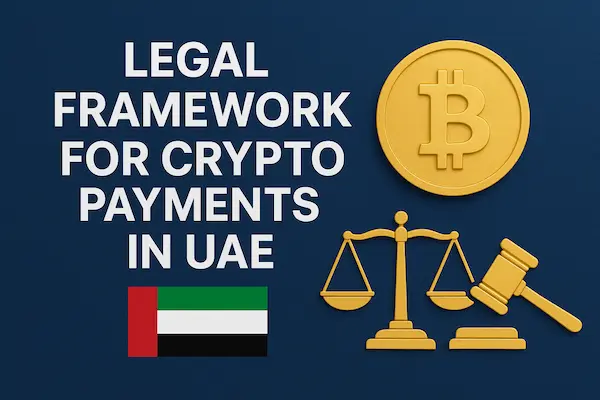
5. How to Accept Crypto Payments in UAE
For many businesses, the idea of taking crypto can feel complicated at first. In reality, the process is straightforward once you partner with the right provider. Merchants across real estate, tourism, and retail are already making the switch because it helps them cut costs and attract international clients. Below is a simple framework showing how to start accepting crypto payments in UAE.
Register a Business Account
Choose a licensed crypto payment gateway that complies with UAE regulations. Providers like XaiGate offer full support for businesses in Dubai and Abu Dhabi.Choose Your Integration Method
Decide whether to connect through an API for full customization or use ready-made plugins for platforms like Shopify, Magento, or WooCommerce.Enable Stablecoin or Crypto Checkout
To reduce volatility, configure your system to accept stablecoins such as USDT, USDC, or PYUSD. These are widely used across property, retail, and hospitality sectors in the UAE.Go Live and Monitor Transactions
Once integrated, businesses can start receiving payments instantly. Modern dashboards provide real-time transaction monitoring, settlement reports, and analytics, making it easy to track performance.
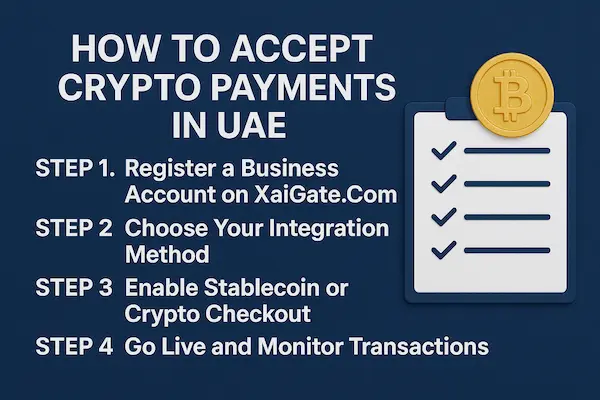
6. Top Industries Accepting Crypto Payments in UAE
The strength of the UAE’s crypto adoption is not limited to one sector. From property developers to luxury hotels and retail brands, different industries are finding unique ways to benefit. This wide adoption proves that crypto payments in UAE are becoming a standard feature of the economy rather than a passing trend.
Real Estate
Dubai is one of the first global cities where entire property deals can be settled in digital assets. Developers now accept stablecoins like USDT and USDC for apartments, villas, and commercial spaces. For international buyers, this removes banking delays and makes the UAE an even more attractive investment destination.Tourism & Hospitality
Hotels, airlines, and travel agencies have started offering crypto as a payment method to international guests. Tourists arriving in Dubai or Abu Dhabi can now book rooms, flights, and packages using digital currencies, creating a seamless travel experience.Luxury Retail
Shopping malls and high-end boutiques are embracing digital payments. From watches and cars to designer fashion, crypto payments in UAE allow luxury retailers to tap into a new class of global customers — many of whom are crypto investors seeking to spend their digital wealth.Freelance & IT Services
With thousands of digital nomads and remote professionals in the UAE, crypto is increasingly used for service payments. Freelancers and IT companies benefit from instant cross-border transactions without the high fees of traditional remittance services.
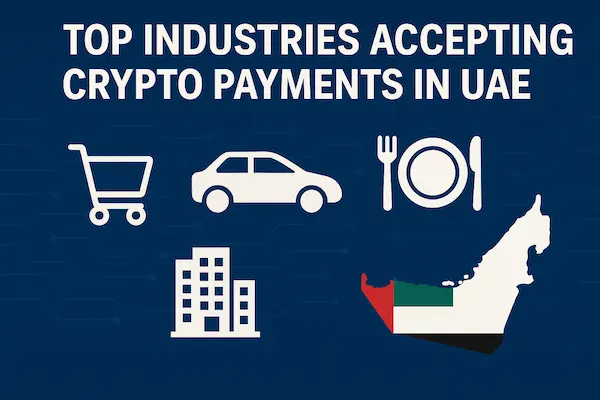
7. Comparison: Best Crypto Payment Gateways in UAE (2025)
As more businesses adopt digital currencies, choosing the right payment provider has become an important decision. The ideal gateway should support stablecoins, charge low fees, and comply with UAE regulations. Below is a comparison of the leading platforms, showing why many businesses prefer specialized solutions for crypto payments in UAE.
| Feature / Gateway | XaiGate | Coinbase Commerce | BitPay |
|---|---|---|---|
| Supported Stablecoins | USDT, USDC, PYUSD | USDC only | BTC, USDT |
| Fees | 0.2% – 0.5% (lowest) | 1% | 1% |
| Settlement Speed | Instant stablecoin payout | 24h delay | 24–48h |
| KYC/AML Compliance | Fully UAE VARA-ready | Global standard | Global standard |
| Best For | UAE Real Estate, Tourism | General e-commerce | Retail & Gaming |
XaiGate stands out for its focus on stablecoins and compliance with Dubai VARA regulations, which makes it ideal for real estate, tourism, and high-value retail transactions. Coinbase Commerce and BitPay are more general solutions but may not offer the same advantages for UAE-based companies. For businesses aiming to lead in crypto payments in UAE, working with a local, regulation-ready gateway provides both security and long-term growth potential.
8. Case Studies: Crypto Payments in UAE
To better understand how digital currencies are reshaping the economy, it helps to look at real examples. These case studies highlight how different sectors are already benefiting from crypto payments in UAE, from real estate to tourism and retail.
1. Case Study 1: Real Estate Company in Dubai
In 2024, a leading property developer began offering buyers the option to pay with stablecoins. Partnering with a licensed gateway, the company enabled secure transactions in USDT and USDC. Within just six months, more than $100 million worth of property was sold via crypto. The developer also reported a 60% reduction in transaction fees compared to traditional banking.
Crypto makes property purchases faster, cheaper, and more attractive to international investors.
2. Case Study 2: Dubai Hotel Chain
A luxury hotel group integrated crypto checkout into its booking system, allowing guests to pay with USDT, USDC, and BTC. The move resulted in a 25% increase in international bookings, particularly from Europe and Asia. Payment times dropped from several days to under five minutes, creating a smoother experience for guests.
Tourism operators that accept crypto payments in UAE gain a competitive edge in attracting global travelers.
3. Case Study 3: Luxury Retailer in Dubai Mall
A high-end jewelry and watch retailer introduced crypto POS terminals and online checkout through a VARA-compliant provider. Customers could now purchase luxury goods with stablecoins and major cryptocurrencies. Within a year, sales increased by 15%, with many new clients being crypto investors from abroad.
Takeaway: Luxury retail in the UAE benefits from crypto adoption by reaching new customer groups and reducing chargeback risks.
9. Challenges of Crypto Payments in UAE
Despite strong growth, adoption is not without hurdles. Businesses and regulators still face certain obstacles that must be addressed before crypto can reach full mainstream use. The most important challenges for crypto payments in UAE involve market volatility and compliance requirements.
Volatility Risks
One of the most common concerns is the unpredictable nature of cryptocurrencies like Bitcoin or Ethereum. Their value can rise or fall sharply within hours, creating uncertainty for merchants. This is why stablecoins have become the preferred choice in the UAE, offering reliable, dollar-pegged value for everyday payments. By focusing on USDT, USDC, and PYUSD, businesses can limit volatility risks while still enjoying the advantages of digital assets.
Compliance and KYC Requirements
Another challenge lies in meeting strict regulatory obligations. The UAE has taken a proactive approach by requiring all businesses handling digital payments to follow anti-money laundering (AML) and know-your-customer (KYC) standards. While these rules build trust, they can also be demanding for smaller businesses without strong compliance systems. Licensed gateways play a crucial role in helping companies meet these obligations while still offering smooth crypto payments in UAE.
10. Future of Crypto Payments in UAE (2025 & Beyond)
The UAE has already established itself as a global pioneer in digital finance, but the next few years promise even greater transformation. With government support, corporate adoption, and rapid technological innovation, the future of crypto payments in UAE looks even more promising. Several major trends are shaping what lies ahead.
1. AI-Powered Payment Automation
Artificial intelligence is expected to play a major role in simplifying transactions. Businesses may soon rely on AI-driven payment bots that can automatically manage settlements, monitor exchange rates, and reduce risks. This will make crypto adoption even more seamless for companies of all sizes.
2. Metaverse Commerce in Dubai
Dubai has already invested in metaverse infrastructure, hosting events and conferences in virtual spaces. In the future, tourists and consumers may use crypto payments in UAE not only in physical stores but also in metaverse platforms, buying tickets, booking services, and interacting with digital marketplaces.
3. The Digital Dirham (CBDC)
Perhaps the most significant development is the Digital Dirham, a central bank digital currency being tested by the UAE Central Bank. Designed to work alongside stablecoins, this CBDC will provide official, government-backed support for digital transactions. It will strengthen cross-border payments and integrate seamlessly with the global network of digital currencies.
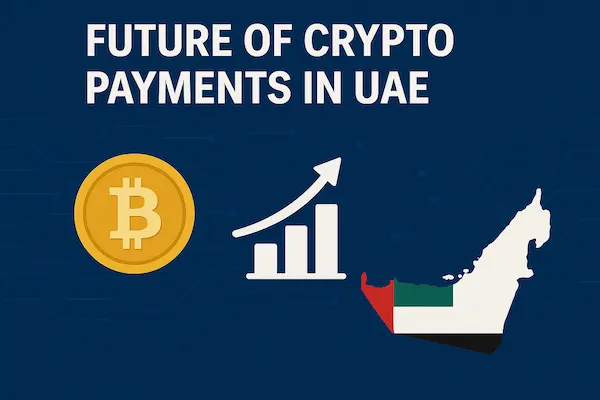
FAQs: Crypto Payments in UAE
1) Are crypto payments legal in UAE?
Yes. Crypto payments in UAE are permitted under Dubai’s VARA and the UAE Central Bank, provided businesses follow licensing plus AML/KYC requirements.
2) Which industries in the UAE accept crypto today?
Real estate, tourism & hospitality, luxury retail, and freelance/IT services. Many developers, hotels, airlines, and malls already support digital asset checkout.
3) Which coins are most used for payments?
Stablecoins dominate: USDT, USDC, PYUSD. BTC and ETH are accepted but less common for day-to-day settlements due to price volatility.
4) Can foreigners buy property with crypto in the UAE?
Yes. International buyers can purchase apartments, villas, and commercial units using crypto—often via stablecoin invoices and instant settlement.
5) What are the top benefits for UAE merchants?
Lower fees (about 0.2%–1%), faster cross-border settlement (minutes), fewer chargebacks, and access to a global, crypto-native customer base.
6) What risks should businesses consider?
Price volatility, compliance workload, and wallet-handling errors. Using stablecoins, licensed gateways, and clear treasury policies reduces these risks.
7) Do UAE banks work with crypto payments?
Some banks cooperate with licensed virtual-asset businesses, enabling AED fiat settlement tied to crypto payments in UAE, even if they don’t custody coins directly.
8) How can a business start accepting crypto in the UAE?
Choose a licensed gateway, integrate via API or plugin, enable stablecoin checkout (USDT/USDC/PYUSD), set AML/KYC flows, then go live and monitor transactions.
9) How is the Digital Dirham (CBDC) different from stablecoins?
The Digital Dirham is state-issued by the UAE Central Bank; stablecoins are privately issued but USD-pegged. Both are expected to coexist and streamline crypto payments in UAE.
10) What’s next for crypto payments in the UAE after 2025?
More merchant adoption, AI-automated settlements, metaverse commerce pilots, and broader CBDC rails—cementing the UAE as a global leader in digital finance.
Conclusion: The Future of Crypto Payments in UAE
The journey of crypto payments in UAE over the last few years has been remarkable. What started as a bold experiment is now a regulated, mainstream reality across real estate, tourism, and retail. In 2025, the combination of Dubai’s VARA regulations, the UAE Central Bank’s Digital Dirham pilot, and the widespread use of stablecoins like USDT and USDC has positioned the country as one of the world’s most advanced digital economies.
This growth is not just about technology — it reflects the UAE’s vision to diversify its economy and strengthen its role as a global trade hub. Businesses that adopt crypto today are not only reducing costs and improving efficiency but also showing international clients that they are ready for the future of finance.
With more industries joining the movement, from luxury retail to freelance services, the UAE is building a unique model where innovation, trust, and regulation move together. The next wave — AI-driven settlements, metaverse commerce, and government-backed CBDCs — will only accelerate adoption further.
Quick Recap: Why Crypto Payments in UAE Are Booming
| Factor | 2025 Highlights |
|---|---|
| Legal Clarity | Dubai VARA licenses and UAE Central Bank oversight |
| Popular Assets | Stablecoins (USDT, USDC, PYUSD) dominate transactions |
| Main Industries | Real Estate, Tourism, Luxury Retail, Freelance Services |
| Key Advantages | Lower fees (0.2–1%), instant global transfers, new customer markets |
| Challenges | Volatility (solved by stablecoins), AML/KYC compliance |
| Future Outlook | AI payment automation, metaverse adoption, Digital Dirham (CBDC) integration |
The UAE has proven that digital assets can be trusted, regulated, and profitable. For businesses, the question is no longer if they should accept crypto — but how fast they can integrate it before competitors move ahead.
If you want a gateway that is secure, low-fee, and fully VARA-compliant, the answer is clear: XaiGate. Whether you run a real estate company, hotel chain, or luxury store, XaiGate makes it easy to start accepting crypto payments in UAE today — safely, quickly, and globally.
For daily updates, subscribe to XAIGATE’s blog!
We may also be found on GitHub, and X (@mxaigate)! Follow us!

